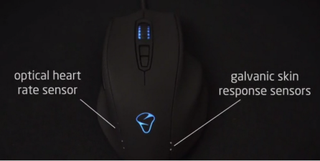
MionixLabs has launched a Kickstarter for a new kind of gaming mouse. The NAOS QG (short for Quantified Gaming) takes the idea of the quantified self—wearables or other devices that track body metrics such as heart rate and body temperature—and applies it to gaming.
The NAOS QG takes MionixLabs NAOS model—already a great, comfortable mouse in its own right—and adds a heart rate sensor and galvanic skin response sensors. The idea is to track your body's physical response during gameplay—heart rate, skin response, actions per minute, and movement data. With the accompanying software's customizable overlay, you can track your stress level in real-time while playing and then analyze the data afterwards, with time-stamped snapshots taken at peaks and level spikes.
It's a bit of a weird notion, and we wonder if this sort of data can actually help improve your game in any way. One particularly interesting application put forth in Mionix's pitch video is the idea of tracking your teammates' stress levels in real-time during a multiplayer match. The thinking goes that by knowing which of your teammates are more or less stressed, you can adjust your strategy accordingly to give them a break or send someone more prepared into a fight. Like we said, who knows if it ends up being a legitimately worthwhile strategy—why not just use voice chat?—but it's interesting nonetheless.
With more than a month to go, the NAOS QG's Kickstarter has already raised 30% of its $100,000 goal. Assuming it gets successfully funded and everything goes according to plan, the mouse will be available in July 2015 for $129 MSRP. Kickstarter earlybirds can snag one for $89.
The biggest gaming news, reviews and hardware deals
Keep up to date with the most important stories and the best deals, as picked by the PC Gamer team.
As the former head of PC Gamer's hardware coverage, Bo was in charge of helping readers better understand and use PC hardware. He also headed up the buying guides, picking the best peripherals and components to spend your hard-earned money on. He can usually be found playing Overwatch, Apex Legends, or more likely, with his cats. He is now IGN's resident tech editor and PC hardware expert.
Most Popular






